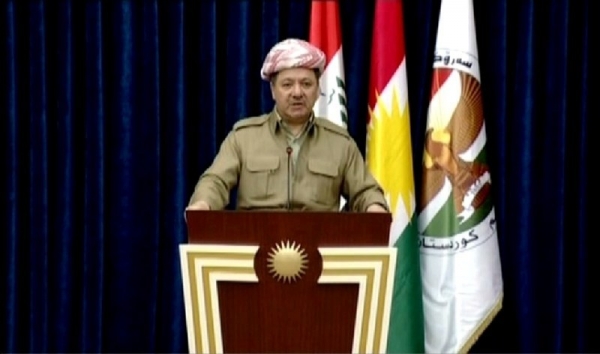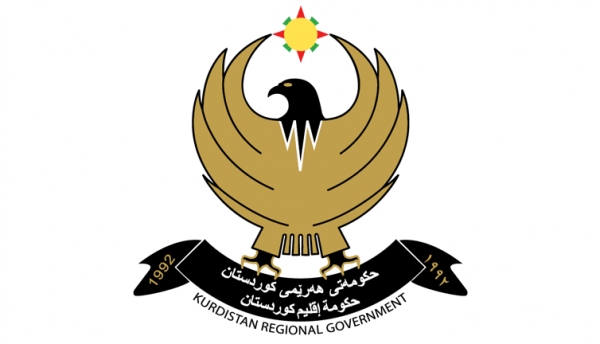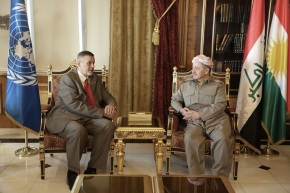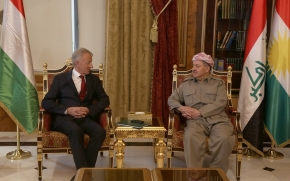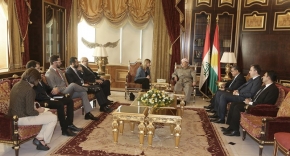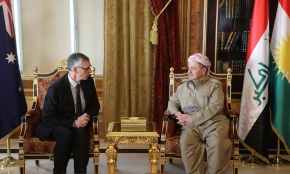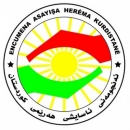President Barzani's Message on Occasion of Eid Al Adha
In a message on the occasion of the Muslim Eid of Al Adha, Kurdistan Region President Masoud Barzani congratulated the Muslims of Kurdistan and the whole world. He also talked about the presidency issue and the need for a speedy resolution of this issue.
"At a time when our people are going through a challenging time and is facing major threats, there was no need to approach the presidency issue in the way it has been handled. I have done what I was required to do (by law) by calling for elections before the end of the presidency’s tenure but it was not possible to conduct elections.
"Earlier, I had on several occasions called on the political parties and the parliament to resolve this issue but to no avail. I have not in any way requested to stay on as president. I reject all notions that there are no candidates to succeed me. I am very concerned about how this issue has been protracted. The people of Kurdistan have the right to complain, especially when we are facing pressing issues like the disputes with Baghdad, the economic crisis, the drop in oil prices, the large number of displaced people in Kurdistan, and above all the fight against the ISIS terrorists."
The President further stated that, "If the current 5-party meetings do not succeed, all political parties- those in parliament and those outside the parliament, must convene in order to reach a suitable solution. I fully understand the rule of law and I, more than anyone else, should respect the law. I suggest that that all political parties make a decision that, before 2017, the powers and the election mechanism of the president be formulated in the constitution so that the people will have the final say on this matter. Whether I stay on as president or not, should not become part of the problem of deciding on the powers and mechanisms for electing the president, as these are two separate issues. "
President Barzani paid tribute to the resilience of the people of Kurdistan and thanked them for their patience.
"I greatly appreciate the patience of the people of Kurdistan for standing firm in the face of current challenges. I also understand the problems that our youth face. I ask them that instead of leaving their country, they should strengthen their hope. We have serious problems but we can overcome them. The reform process that we started several years ago should be rejuvenated. No crisis can stand in the way of our people to decide their future. My priority is the realization of the right of our people to decide their future and to end the threat of ISIS on our people," said the President at the end of his statement.
KRG Ministry of Interior's Joint Crisis Coordination Centre statement on the humanitarian crisis
Without a significant increase in funding from the International Community and financial transactions from Government of Iraq, the Kurdistan Region will not be able to contain the humanitarian crisis.
The Kurdistan Regional Government has long adopted an inclusive and welcoming policy free of discrimination based on religious, cultural, ethnic or political identity. We recognize the vital importance of aiding those that are fleeing violence and unrest from other parts of Iraq in order to establish and maintain peace in this conflict-ridden area.
Kurdistan Region as a Safe Haven
From 2003 up until 2013, KRI opened its doors to more than 600,000 internally displaced Iraqis. The Government and the people of the Kurdistan Region understood that sustainable peace and development cannot be accomplished if some members of society are marginalized, and so we championed for inclusiveness by ensuring that these new members of our society were granted the same rights, protections and access to services.
Today, the Syrian civil war has produced one of the largest displacement crisis in the world and a significant number of Syrians fleeing violence have sought safety and shelter in the Kurdistan Region. In a sudden escalation of violence, the brutal invasion of the Islamic State in 2014 resulted in the forced displacement of three million Iraqis. The situation has rapidly developed into a full scale level-three humanitarian crisis. Offering protection and shelter, the Kurdistan Region once again became a safe haven for more than half of the displaced population and we have continued to keep our borders open.
Today, the Kurdistan Region is offering safety, protection and services to 280,000 Syrian refugees and up to 1.5 million IDPs. In 2014, an average of 80,000 IDPs entered the Kurdistan Region every month. These figures exclude the displaced populations served by the KRG in the neighboring provinces. As a result of multiple waves of displacement, the population of the Kurdistan Region has increased by almost 30%, placing immense pressure on existing resources and services. While the nature of the crisis challenges our ability to collect exact displacement figures, the number is significant enough to raise acute emergency alarms.
Containing an Extended Level-Three Crisis
The Government of Iraq has unconstitutionally withheld KRG’s 17% share of the annual budget for the past 17 months. This has crippled the KRG’s ability to maintain public services for the local population and meet the basic needs of the IDPs. Confronted with the trifecta of crises – loss of 90% of the fiscal transfers, the refugee and IDP crises and the war on ISIS – KRG cannot maintain its level of contribution and open-door policy without putting the safety and welfare of the population and stability of the Region at risk. Whilst the initial consequences are apparent, the full scale of the impacts is still unfolding due to the on-going nature and magnitude of the conflict. Up to date, the KRG has managed to contain the crisis and meet the basic needs of the affected populations with the assistance of UN Agencies and national and international NGOs. Yet the heaviest burden has been borne by the host communities, whose living standards, access to services and opportunities have drastically deteriorated over the past few years. Regrettably, the GoI has remained largely absent in the response to the IDP crisis in the Kurdistan Region despite its constitutional duty to its displaced citizens.
Contingency and Preparedness
In one of the world’s most complex humanitarian crisis, the KRG and humanitarian partners on the ground are challenged to meet the deepening needs of a population in protracted displacement, while also responding to new emergencies and influxes. The military operations and subsequent displacements from Anbar have offered an insight into the likely outcomes of the anticipated liberation of Mosul. The worst case scenario is warning of the displacement of one million people. Based on previous displacement trends, geographic proximity, safety and security in the Kurdistan Region and the restricted access policies of other provinces in Iraq, the majority of the new IDPs will more than likely flee to the Kurdistan Region.
Preventing Regional Collapse
Over the past years, the refugee and IDP response plans have remained chronically underfunded. At its conclusion, the Strategic Response Plan had been funded at 26% while the corresponding figure for the Refugee Response stands at an alarming 19%. Adding to this pressured funding situation, the GoI has not only lacked in providing assistance but has also withheld KRGs share of the national budget. In the recently launched Humanitarian Response Plan (HRP), the humanitarian community has appealed for $500 million. If funded, the HRP will alleviate acute suffering but fall short of tackling the impact on host communities and society at large. A recent report published by the World Bank and the Ministry of Planning estimates the cost of stabilising the region back to the pre-crisis level at $1.4 billion under the baseline scenario, in which no new influx of displaced populations enter the Kurdistan Region. In the worst-case scenario, the World Bank and MoP have estimated a staggering need of $2.4 billion for stabilization costs. It is the regrettable conclusion of the KRG that without a drastic increase in funding from the international community and financial transactions from the GoI, the Region will neither be able to cope with the current crisis, nor respond to anticipated new displacements. As humanitarian partners formulate contingency plans, it is paramount to recognize that the Kurdistan Region has exhausted its response and absorption capacity and is at risk of total collapse. KRG remains committed to its humanitarian responsibilities and will continue to voice the plight of the women, men and children in distress. We are calling on the international community and the GoI to provide the region with the necessary resources and technical support to continue offering a safe haven to those in need.
President Barzani Receives U.N. Secretary General's Envoy for Iraq
Salahadin, Kurdistan Region of Iraq, (Krp.org)- President Masoud Barzani received a United Nations delegation today at his office. The delegation was headed by Mr. Jan Kubis, the Secretary General's Special Representative for Iraq and head of the United Nations Assistance Mission for Iraq, UNAMI. During the meeting President Barzani and Mr. Kubis spoke of a number of issues including the current political situations in Baghdad and Erbil. They also discussed the military advances of the Peshmerga and Iraqi forces against the terrorists of the Islamic State.
Mr. Kubis commended the Kurdistan Region's role in continuing to provide assistance for refugees from Syria and IDPs from the rest of Iraq, adding that Kurdistan "has been, for years, an island of stability," and hoped that that would continue.
President Barzani Receives Hungary's Ambassador to Iraq
Salahadin, Kurdistan Region of Iraq, (Krp.org)- President Msoud Barzani received Mr. Tibor Stimari, Hunagry's ambassador to Iraq. President Barzani began the meeting by expression his satisfaction towards Hungary's military support for Iraq and the Kurdistan Region in the current war against the terrorists of the Islamic State, adding that such support from coalition members is of immense importance to the Kurdistan Region and Iraq. President Barzani and ambassador Stimari also spoke of the ongoing advances made by Iraq and the Kurdistan Region against the terrorists of the Islamic State.
Ambassador Stimari reiterated Hungary's support for Kurdistan, stating that the ongoing war against the terrorists must receive the support of all coalition members.
President Barzani and ambassador Stimari also spoke of the political situation in the Kurdistan Region where President Barzani reiterated his stance that there are no political differences which can affect the stability of the Kurdistan Region and that the stability for which the Region has been known will continue and will only be enhanced.
President Barzani Meets United States Institute of Peace Delegation
Kurdistan Region President Masoud Barzani met with a delegation from the United States Institute of Peace headed by Nancy Lindborg, President of the Institute.
The President and the USIP delegation discussed the political and security developments in Iraq and in the wider region, in particular the plight of IDPs and refugees in Kurdistan and the recent wave of refugees and migrants heading to Europe.
Nancy Lindborg briefed the President about her Institute’s capacity-building and training programs in Kurdistan in cooperation with the KRG, and thanked the KRG for their support. She also praised the generosity of the KRG in taking in close to 2 million IDPs and refugees, including protection provided for Christian and Yezidi minorities.
President Barzani thanked the USIP for its activities and its support of the KRG and expressed his full support to their operations in Kurdistan.
President Barzani Welcomes Australian Ambassador to Iraq
Kurdistan Region President Masoud Barzani today welcomed Australia’s new Ambassador to Iraq, Christopher Langman. The President and the Australian Ambassador reviewed the fight against ISIS, including Australian contribution in air support to peshmerga, political and security developments in the country, and the situation of IDPs and refugees in Kurdistan.
Ambassador Langman paid tribute to the bravery and sacrifices of the peshmerga forces in the fight against ISIS, and reiterated his country’s commitment to continue to support the peshmerga forces as part of the international coalition against ISIS.
President Barzani Meets Senior US Delegetion
Kurdistan Region President Masoud Barzani today met with US Ambassador to Iraq Stuart Jones, US Presidential Deputy Special Envoy to the Global Coalition to Counter ISIS Brett McGurk, and senior US military generals to discuss the status of the fight against ISIS.
They discussed the ongoing efforts to defeat ISIS in both Iraq and in Syria and preparation for the liberation of Mosul, including cooperation and coordination among the peshmerga, the Iraqi, and the coalition forces.
They also discussed the political developments in the country and relations between Erbil and Baghdad.
The US continues its support to Kurdistan Region Peshmerga forces
Erbil, Kurdistan Region, Iraq (cabinet.gov.krd) - Kurdistan Region Prime Minister, Nechirvan Barzani, yesterday received, US Ambassador to Iraq Stuart E. Jones, and Deputy Special Presidential Envoy for the Global Coalition to Counter ISIS, Brett McGurk, and their accompanying delegation.
The two sides discussed the security situation in Iraq in general and Kurdistan Region in particular, and the recent developments in the war against Islamic State terrorist organisation, ISIS.
The delegation reiterated the US military support to Peshmerga forces, stressing on coordination between the United States, Kurdistan Regional Government, KRG, and Iraqi Federal Government.
Regarding the Kurdistan Region presidency issue, the US delegation expressed its support for continuation of the talks among the Kurdistan Region political parties, urging the need to put the war against ISIS as the first priority of the Region at this moment. They expressed their hope that Kurdistan Region Political parties will soon reach an agreement.
Prime Minister Barzani expressed his gratitude to Ambassador Stuart Jones, and the United States army in Iraq for their support to the Kurdistan Region. He said, however, for the next phases in the war against ISIS, with the aim to liberating the areas under ISIS control, a comprehensive plan, with coalition forces support, particularly US army’s support, for Peshmerga and Iraqi forces, are needed.
On the Kurdistan Region presidency issue, Prime Minister Barzani pointed out that the talks among Kurdistan Region political parties are going on seriously to reach a suitable solution in the interest of the people and the stability of the Region. He stressed that Kurdistan Region President, Masoud Barzani and the Peshmerga forces give priority to the war against ISIS.
The talks between KRG and the Iraqi Federal Government on finding an appropriate solution for the outstanding issues, the situation in the Middle East and neighbouring countries were also discussed in the meeting.
Erbil Governor: “IDPs pose no security threat”
Erbil, Kurdistan Region, Iraq (cabinet.gov.krd) - Erbil Governor, Nawzad Hadi, denied that accommodating the large number of internally displaced persons, IDPs, and refugees poses a security threat to the Kurdistan Region.
In an interview with Kurdistan Regional Government, KRG, website, the Governor of Erbil said, “The security officials have been examining security challenges, and terrorist acts and crimes committed in the past. Based on the cases investigated that have been referred to the courts, none were linked to IDPs.”
He stressed that “IDPs and refugees are in need for more assistance, and that they are not linked to security issues. Erbil is safe and secure, and there is no significant security concern.”
Erbil Governor denied allegations, suggesting that the presence of IDPs and refugees in Erbil may lead to security issues.
The Kurdistan Regional Government works closely with local and international organisations to provide basic necessities to refugees and internally displaced persons, who have been threatened by the Islamic State terrorist organisation, ISIS and have sought safety in the Kurdistan Region.
Nawzad Hadi said the presence of the IDPs in the Kurdistan Region is temporary as the international coalition against ISIS is working to liberate areas currently under the control of terrorists.
He reiterated that accommodating and offering assistance to IDPs and refugees in the Kurdistan Region is a humanitarian act that has been acknowledged and appreciated by the international community.
Dibagah Camp
Speaking last week at the opening of Dibagah IDP camp, built by the Emirates Red Crescent, Erbil Governor said, this camp, which comprises one thousand units, is for IDPs from Makhmour District.
The camp includes Kurds and the Arabs mainly from Sultan Abdulla and nearby villages captured by ISIS. Some Arab citizens accommodated in the Dibaga camp are fighting ISIS alongside Peshmerga forces.
Erbil Governor said, “With the assistance of UN Agencies, the KRG has allocated a special budget for IDPs. The Dibagah camp is not the only project implemented by the Emirates Red Crescent. There are other projects including a camp in Bahraka District, and several other food and water distribution programs for IDPs.”
An estimated 1.8 million displaced people, mainly from Anbar and Mosul, including close to 250,000 Syrian refugees fled to the Kurdistan Region. This huge displacement occurred after the Syrian civil war began in 2011 and especially when ISIS overran a large part of Iraqi territory in 2014.
PESHMERGA FORCES SUCCESSFULLY CLEAR OVER 150 SQUARE KILOMETRES SOUTH OF KIRKUK
At 0530hrs on September 11, Peshmerga forces launched a large-scale offensive in South of Kirkuk to further weaken ISIL's ability to threaten the Kurdistan Region. By 1315hrs, over 150 square kilometres were reclaimed, including the following villages: Albu Mohammed, Albu Yusif, Smud, Dlati Bchuk, Dlati Gowra, Sab'nisan, Tl Raba', Zenqare and Gm Bus.
During the offensive, Peshmerga forces successfully took control of the strategic Dusera Heights, located South of Daquq, and an additional stretch of the Kirkuk-Baghdad Highway, further limiting ISIL's freedom of movements.
International Coalition warplanes targeted dozens of ISIL positions from early hours of the morning and provided close air support to Peshmerga forces. The offensive, which was launched from two fronts South of Daquq, included approximately 1,500 Peshmerga and resulted in killing at least 40 ISIL terrorists.
One VBIED was destroyed by an International Coalition airstrike.
Counter-IED teams are now clearing the heavily-mined area.
In the last six months more than 530 square kilometres South of Kirkuk have been cleared as a result of four large-scale offensives.
Office of The Chancellor
Kurdistan Region Security Council (KRSC)
More...
Latest News
- President Erdoğan reaffirms Türkiye’s continued support for Iraq and the Kurdistan Region
- President Nechirvan Barzani’s message on the 126th anniversary of Kurdish journalism
- President Nechirvan Barzani at the Sulaimani Forum: The country must bring us all together
- President Nechirvan Barzani meets with European Union Ambassador
- President Nechirvan Barzani receives French Ambassador
- President Nechirvan Barzani visits Iranian Consulate General to pay respects to victims of Kerman terrorist attack
- President Nechirvan Barzani receives outgoing French Ambassador
- President Nechirvan Barzani condemns terrorist bombings in Iran
- President Nechirvan Barzani meets with US Deputy Secretary of State
- President Nechirvan Barzani’s New Year Address
- KRG Prime Minister Meets with US Deputy Secretary of State
- KRG Prime Minister Engages in Key Talks with UNAMI Chief
- KRG Prime Minister Hosts Diplomats from Iraq and Kurdistan Region
- KRG Prime Minister Meets with the UN’s Secretary-General at COP28
- President Nechirvan Barzani meets with Turkish Ambassador
- KRG Prime Minister Welcomes UK Military Delegation
- President Nechirvan Barzani meets with UK Chief of the Defense Staff’s Senior Middle East Advisor
- KRG Prime Minister Discusses Regional Issues and Domestic Policies in Special Panel
- KRG Prime Minister Meets with Former British Prime Minister
- MEPS Forum in Duhok Highlights Climate Change Among Key Global Challenges
- KRG Prime Minister Meets with United Nations Delegation
- President Nechirvan Barzani and French Ambassador discuss the situation in Iraq and the region
- President Nechirvan Barzani meets with Head of the Independent Strategic Review of UNAMI
- KRG Prime Minister Inaugurates 5th International Trade Fair for Industry and Construction
- KRG Prime Minister Meets Qatar's Consul General
- President Nechirvan Barzani meets with Iraq’s Oil Minister
- KRG Prime Minister Welcomes Cardinal Sako of the Chaldean Catholic Church
- KRG Prime Minister Meets with Iraq's Energy Officials
- KRG Prime Minister Meets with British Ambassador
- President Nechirvan Barzani meets with UK Ambassador to Iraq

